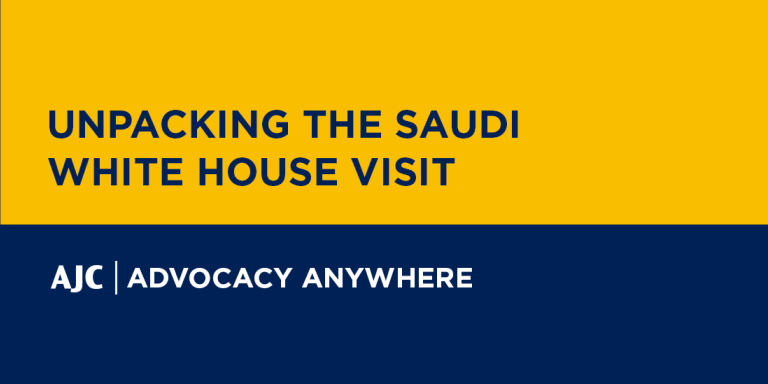Testimony to the Platform Drafting Committee
American Jewish Committee (AJC), the global advocacy organization for the Jewish people, stands up for Israel’s right to exist in peace and security; confronts antisemitism, no matter the source; and upholds the democratic values that unite Jews and our allies. AJC has 25 U.S. regional offices, 15 overseas posts, and 38 partnerships with Jewish communities and institutions worldwide.
In the wake of Hamas’ October 7 attack—the worst massacre of Jews since the Holocaust—AJC has mobilized its global network to tackle the unprecedented threats facing world Jewry. From world capitals to college campuses, AJC works with leaders across society to support Israel and counter surging antisemitism, and we leverage strategic communications to educate, counter misinformation, and shape public opinion.
We respectfully urge the Platform Drafting Committee to incorporate the following language as planks of the Party Platform.
Maintaining a Strong U.S.-Israel Relationship and
Promoting Israel’s Place in the World
Israel, since its founding, has enjoyed a strong alliance with the American people and its government, based on the unshakable foundation of shared values and goals. The United States must condemn those who deny or disregard Israel’s legitimacy and seek to hold Israel’s behavior to a standard applied to no other nation. Although granted no lasting respite from war and terror throughout its 75-plus-year history, Israel has been a beacon of democracy and progress and a contributor to regional security and global prosperity.
Continued expansion of U.S.-Israel ties advances the strategic interests of both nations. No nation in the world cooperates more fully and reliably with the U.S. than the State of Israel in strategic planning, intelligence-sharing, military training, and technological development. It is no coincidence that the antidemocratic forces in the world that demonize Israel also view the United States as their enemy. Bipartisan support, as well as the enduring tradition of providing U.S. security assistance to Israel, is critical.
Addressing terror threats | Since October 7, the world has witnessed how Hamas, an Iranian-backed terror group, devotes its resources to terrorist activities rather than caring for its civilians. Hamas has repeatedly shown it has no actual interest in governing Gaza or in ensuring the wellbeing of the Palestinian people. Its sole goal is the elimination of Israel and the Jewish people. Hamas must not be allowed to govern in Gaza.
The Iranian-backed Hezbollah terror army in Lebanon has amassed an arsenal of rockets, missiles, and mortars with more firepower than the armies of many NATO members. Since October 7, Hezbollah has fired more than 3,000 rockets and more than 600 anti-tank missiles and drones at Israeli civilian and military targets critical to the defense of the Jewish state. As Israel continues to fight against terror groups on simultaneous fronts with a near constant threat to Israeli citizens, Israel’s right to defend itself must be recognized unequivocally. These terror groups must be universally designated as such, sanctioned, and dismantled.
Planning for a “Day After” the war | A definitive resolution of the Israeli-Palestinian conflict in the current highly charged context – with the wounds of October 7 in Israel not close to healed, hostages still held, hostilities on multiple fronts, and the massive devastation and loss of Palestinian life in Gaza – is not close at hand. Before the parties can embark on a political path forward, the war in Gaza must come to an end; the only thing standing in the way of a ceasefire, and ultimately a durable, enduring cessation of violence, is Hamas. When it releases the hostages and lays down its arms, progress can be made. Further, we affirm that the land between the Jordan River and the Mediterranean Sea, indigenous to both Jews and Arabs, cannot be the exclusive domain of one people. Alongside the thriving, democratic, and pluralistic state of Israel – the Jewish homeland, with citizens of many faiths and an integrated Arab minority – an autonomous, non-militarized, significantly contiguous political entity must ultimately be created, through direct negotiations between the parties, to afford national rights to the Palestinian population. The path to statehood must be clearly defined, with international recognition following – not preceding – the achievement of milestones agreed upon by the two parties, including the abandonment of educational curricula and civic practices that delegitimize the other, or payment structures that reward and incentivize “martyrdom.” There can be no Palestinian state unless and until the Palestinian narrative acknowledges that the modern Jewish state of Israel is here to stay.
Continuing regional integration | As the October 7 Hamas massacre and Israel’s military response continue to convulse the region and shape perceptions about Israel, the U.S. must strive – in close cooperation with allies and partners in the region – to continue to expand the circle of peace in the Middle East, strengthen the Abraham Accords, and promote normalization between Israel and Arab and Muslim-majority countries.
Countering Iran’s Power in the Middle East
With its nuclear ambitions, advanced missile program, proxy armies, and support for terror, the Iranian regime poses a profound danger to American interests and allies, and to global peace and security. Since the Islamic Republic’s inception in 1979, the regime has routinely employed terrorism as a tool to advance its nefarious goals. On numerous occasions over the past decades, Tehran has enlisted its diplomats to plot and commit terrorist acts, whether it be assassinations of Iranian dissidents and foreign diplomats or targeting Jewish sites and Western political leaders in Europe and elsewhere. The Iranian regime's increasing collusion with Russia, China, and North Korea must be of particular concern to the U.S. and our allies.
Among Iran’s most effective tools for destabilization and destruction in the Middle East is its support of terrorist proxies, including Hezbollah, Hamas, Palestinian Islamic Jihad, the Houthis, and the Iraqi Popular Mobilization Units (PMU). Iran’s regime and proxies pose an existential threat to America's key ally, Israel. The brutal surprise attack on Israel by Hamas on October 7, 2023, along with the unprecedented and massive missile and drone attack launched by Iran against Israel on April 13, demonstrate the Iranian regime’s threatening, destabilizing efforts in the region and the threat they pose to U.S. allies and interests. Since the outbreak of war in Gaza, other Iran-backed groups throughout the Middle East have carried out attacks against U.S. forces in Iraq and Syria and international shipping in the Red Sea, drawing retaliatory U.S. military action.
The U.S. and coalition partners must intensify their retaliatory actions against Iran and its proxies, including the Houthis and related militias, for hostile acts that have taken the lives of American soldiers, among others, and could widen the current conflict. Universal designation of the Islamic Revolutionary Guard Corps and Hezbollah as terrorist entities; insistence on International Atomic Energy Agency access to, and monitoring of, declared and suspected nuclear sites; and full enforcement of oil, missile, and arms transfer sanctions, should be the beginning but not the end of concerted allied steps to deter and punish Iranian violations of international law.
Addressing Antisemitism
Communities throughout the United States are currently seeing an unprecedented rise in antisemitism. According to AJC’s State of Antisemitism in America 2023 Report, more than 6 in 10 American Jews say the status of Jews in the United States is “less secure than a year ago.” Young Americans are feeling particularly threatened and have reported greater instances of threats both online and in person. In fact, almost half of American Jews have changed their behavior at least once out of fear of antisemitism. This is an issue that must continue to be addressed in all sectors of society. Antisemitism is not just a Jewish issue, it is often the canary in the coalmine, challenging universal interests and American values. Whatever its form, opposition to antisemitism and hatred in all its forms must be unequivocal.
Embracing a whole-of-government response | Every level of government should consider adopting its own strategy to counter antisemitism. National strategies to counter antisemitism are effective when they engage all levels of government with specific, time-bound responsibilities. A national coordinator with authority and resources can ensure government coordination and strategy implementation.
Engaging all of society | According to AJC’s State of Antisemitism in America 2023 Report, 92% of U.S. adults believe “antisemitism affects society as a whole; everyone is responsible for combating it.” It must not be the responsibility of Jews alone to sound the alarm against antisemitism and extremist ideologies that threaten society at large. Civil society must unite across ideological divides, recognizing that antisemitism, like any form of hate or bigotry, threatens us all. Corporations, social media platforms, academic institutions, media, and influential voices – among others – play critical roles in countering antisemitism.
Addressing antisemitism in schools | American students must feel safe to attend classes on college campuses, but increasingly disruptive and sometimes violent protests have created an environment that makes students feel unsafe. These protests have also disrupted the basic functioning of these universities, depriving students of the ability to attend classes, prepare for finals and otherwise gain access to critical areas on campus. Universities must be held accountable for allowing the virus of antisemitism to infect campus life. Clarity is needed around policies, reporting, and response. Educational institutions must prioritize physical security, make clear that antisemitism is not tolerated, and be prepared to impose discipline.
Embracing tools to understand antisemitism | To counter antisemitism, a crucial first step is to define it. Our party endorses, as a non-binding resource, the International Holocaust Remembrance Alliance (IHRA) Working Definition of Antisemitism – a clear and concise description of antisemitism in its various forms, including discrimination, hatred, conspiracy theories, Holocaust denial, and the denial of Israel’s right to exist. Promoted by the State Department and used by the Department of Education to assess antisemitism in schools, this definition can be an essential tool giving state and local governments, law enforcement agencies, and civil society organizations increased capacity to identify, prosecute, and deter antisemitic incidents.
Depoliticizing the fight against antisemitism | While bipartisanship has been critical to U.S. success in countering hatred of Jews in the U.S. and abroad, the fight against antisemitism is increasingly politicized. For the Jewish community, antisemitism is not political: it’s personal. When considered only through a partisan or ideological lens, antisemitism is not being countered but instrumentalized.
Improving hate crimes reporting | Despite Jews only accounting for 2% of the U.S. population, the FBI found that more than half of religiously motivated hate crimes were committed against the Jewish community in 2022. Given that the FBI depends on voluntary reporting and law enforcement agencies in many populous localities underreport or fail to report hate crimes, the data continues to reflect only a partial understanding of the state of hate in America. Additionally, 79% of American Jews who experienced antisemitic harassment did not report it to police or other organizations. Insufficient reporting of hate crimes is a global trend that stymies effective response. Antisemitic incidents must be reported to law enforcement and hate crime monitors.
Celebrating Jewish American heritage | Organizations, businesses, academic institutions, and influencers should celebrate Jewish contributions to society, including through Jewish American Heritage Month, which occurs in May. Increasing awareness and understanding of antisemitism must be coupled with a commitment to broadening appreciation of Jewish heritage and contributions to society.
Advancing Democratic Values and Human Rights
Human rights and democracy are integrally linked: democratic institutions are the best way to ensure respect for human rights. America has a vital role to play in combating the assault on liberal democracy taking place in many countries, which is all too often coupled with a rise in antisemitism and prejudice against minorities. The protection of minorities underlies the fabric of democracies, and our party is committed to being a voice for the voiceless, speaking out when vulnerable communities are threatened, and promoting pluralism.
Our party, and the next administration, will hold governments accountable for upholding universal human rights commitments and norms. We commit to developing clear policy and utilizing coordinated government action to prevent and prosecute mass atrocity crimes, the risk of which has risen due to global instability.
Reasserting principled American global leadership | Our party affirms that America must never retreat from its leadership role on the world stage. Strong and principled U.S. leadership in global affairs is the best protection for our nation’s interests, the preservation and advancement of democratic values and human dignity, and the security of our allies. Our party will continue to support efforts to assist Ukraine in its defense against Russian aggression. Longstanding diplomatic relationships – with transatlantic allies, neighbors, trans-Pacific partners, moderate Arab states, and stalwart allies like Israel – are essential to address myriad global threats.
While the U.S. cannot be the world’s policeman, history has amply shown that when the U.S. withdraws—or is perceived to retreat—from the global stage, dangerous vacuums are created, and others—both state and non-state actors—seek to fill them, pursuing goals antithetical to our own. Our nation must be prepared to use all the tools of statecraft to project leadership, vision, strength, and a commitment to human rights.



